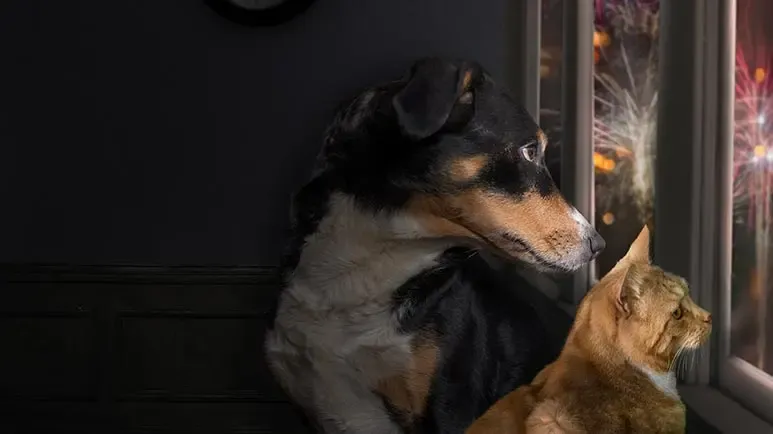How to Comfort Your Pet During Firework Season
New Year's Eve celebrations can be stressful for many pets. Nearly 1 in 2 dogs fear fireworks, and that fear can persist for days. There's much you can do to both protect your pet and make the day less threatening. Try these proven strategies to increase your pet's comfort.

STORY AT-A-GLANCE
- It’s estimated that up to half of pet dogs react fearfully to fireworks; for more than 15% of pups, the fear persists for several days
- The No. 1 step to keeping your pet safe during New Year’s Eve is to keep her indoors, especially as dusk nears
- Keep your pet in a room away from the hustle-and-bustle, where she’s not directly exposed to the loud noises from outside
- Create a safe haven for your pet, with toys, water and a few treats; put on calming music and use herbal remedies for extra stress-relief
- Keep other holiday hazards away from your pet, including alcohol, insect repellents and sunscreens intended for humans, BBQ grills, glow jewelry and citronella candles
You may look forward to a fun-filled New Year’s Eve, complete with family, friends, cookouts and, of course, fireworks. But what’s a festive occasion for you may be stressful — or downright frightening — for your pet. Fireworks are particularly problematic.
While they’re an integral part of many New Year’s Eve celebrations, it’s estimated that up to half of pet dogs react fearfully to them. Further, for more than 15% of pups, the fear persists for several days.
So the damage from New Year’s Eve stress may persist even after your party ends and could take your dog days or, in more than 3% of dogs, weeks or months to recover fully from.1 With a bit of forethought and planning, however, it’s possible to enjoy the holiday while protecting your pet as well.
Keep Your Pet Inside — Especially After Dark
The No. 1 step to keeping your pet safe during New Year’s Eve? Keep her indoors, especially as dusk nears. Even if your pet is normally laid back, she may become spooked by the unexpected bangs and pops happening outside.2
It’s not only dogs that should be kept safely inside — cats and pet birds can become frightened by the noises as well. Ideally, keep your pet in a room away from the hustle-and-bustle, where she’s not directly exposed to the loud noises from outside. Create a safe haven with bedding, a toy or two, and a few treats.
Turn on a TV or music to help muffle the noise from outside. Classical music, in particular, may help calm your dog’s nerves. In a comparison of different sounds (human conversation, classical music, heavy metal music, pop music and a control), classical music was the clear winner when played in a rescue shelter.
The dogs spent significantly more of their time quiet and resting than when other types of sounds were played (including heavy metal, which led to increased barking).3 It’s better to be safe than sorry, so be sure your dog is also wearing a collar with an up-to-date ID tag and/or has a permanent tattoo or microchip.
This way, if she does get lost, you’ll have a better chance of finding her. Ideally, have someone stay home or in the room with your dog to provide extra comfort. However, whatever you do, don’t leave your dog outdoors — and especially not outdoors alone.
Watch Out for These Top Holiday Hazards
There are other holiday hazards to look out for, even before the fireworks start. Keep a close eye on your pet throughout the day, especially if you’re having a get-together at your house. The following things are common seen during holiday celebrations, but they can be dangerous to your pet:
- Alcohol — Keep all adult beverages out of your pet’s reach and make sure your guests do the same. Alcohol is poisonous to dogs and cats. Depending on how much is ingested, your pet can become very intoxicated, weak, depressed and even comatose. Severe alcohol poisoning can result in death from respiratory failure.
- Certain people foods — Even if your pet has a varied diet and a resilient digestive tract, it's best to keep party and barbequed foods out of reach. Feed your dog or cat her regular diet for the holiday, and be especially careful to keep potentially toxic people foods like chocolate, coffee, onions, grapes, raisins and bread dough away from your four-legged family members.
- Matches, lighter fluid and the grill — Some matches contain chlorate, a substance that can damage blood cells, impair respiration and even cause kidney disease. Lighter fluid can irritate your pet's skin and if ingested can cause gastrointestinal (GI) upset and central nervous system depression.
Inhaling lighter fluid can result in breathing difficulties and aspiration pneumonia. Consuming the contents of the grill grease trap is a common cause of summertime pancreatitis in dogs, so make sure to keep furry family members away from the grill. - Human sunscreen and insect repellent — Make sure to use a sunscreen designed specifically for dogs and cats, not products made for humans. If your pet ingests a sunscreen product, it can cause excessive thirst, drooling, vomiting, diarrhea and lethargy. Insect repellents containing DEET can result in neurological problems in pets.
- Citronella — Always keep citronella candles, oils, and insect coils out of reach of your dog or cat. Ingestion can cause stomach irritation, vomiting, secondary aspiration pneumonia and, potentially, central nervous system symptoms in pets.
- Costumes and glow jewelry — Don't give your pet access to glow jewelry, which if eaten can cause excessive drooling, GI irritation and even intestinal blockage. Also think twice about dressing up your pet for the holidays.
Unless your dog (or even less likely, your cat) loves to play dress-up, don't force the issue. Make sure anything you dress your pet in is comfortably loose and doesn't constrict movement in any way.
Give Your Pet Some One-on-One Time Early
A tired pet is typically a better-behaved pet — and one who’s calmer and more likely to be relaxed spending time indoors later on. It’s a good idea to take your dog out early in the morning, long before the festivities start, as it’s cooler — and still quiet — for a long walk or vigorous play session.
Later, when she’s safely tucked away inside in her safe spot, she’ll appreciate the activity she got earlier. Lick mats and interactive toys can be a smart (and delicious) distraction during the evenings’ events.
If you believe your dog has a noise-phobia and gets extremely agitated during fireworks or other loud events, try these 11 options for stress relief. Working with a qualified fear-free animal behaviorist is also recommended to address the behavior before it escalates, as well as consulting an integrative vet who can provide a variety of drug-free calming nutraceuticals.
Since New Year’s Eve happens every year, the sooner you find effective ways to help your dog cope, the more enjoyable the holiday will be for everyone.











